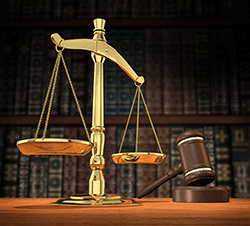Collin County Criminal Court Records Search
When dealing with the criminal justice system in Collin County, Texas, it’s important to understand how the criminal courts operate and what resources are available to the public. The judicial system can be complex, but knowing which courts handle what types of cases and how to access court case information online can be helpful to anyone involved or curious about criminal proceedings in this county. This quick reference guide will give a detailed overview of the Collin County criminal courts and how to conduct a criminal court case lookup.
Overview of Collin County Criminal Courts
Collin County, which is part of the larger Texas judicial system, that handles criminal, civil cases, and family cases. The criminal courts specifically deal with cases that involve alleged violations of the law. This judicial division is tasked with hearing various misdemeanor and felony criminal cases, adjudicating, and handing down appropriate punishments for those convicted.
Types of Criminal Courts in Collin County
The county has multiple courthouses that manage the large array of criminal cases, each with its specific jurisdiction and case types. Understanding which courthouse deals with which type of case is important for anyone wanting to access information for an ongoing or concluded criminal case. Here are the various courthouses that the respective cases:
District Courts: The District Division, which is considered the main trail court in this county, as general authority over felony criminal cases. Felonies are more serious crimes that can include offenses such as robbery, sexual assault, and murder. These courts also handle some civil cases, but their primary focus in the context of criminal justice is on felony matters.
County Courts at Law: The County Courts at Law Division primarily handles less complicated misdemeanor cases. Misdemeanors, which are considerably less severe than felony crimes, can include offenses like petty theft, public intoxication, and vandalism. Although these crimes are less serious, they are nonetheless important and can have major consequences for those involved.
Justice of the Peace Courts (JP): The JP Division manage lower-level offenses and minor infractions, such as traffic violations and some low-level misdemeanors. These courts provide a more informal setting compared to higher-level courts and can resolve cases more quickly.
Municipal Courts: The Municipal division, which primarily focuses on lesser crimes and city ordinance violations. These can include minor criminal offenses, criminal infractions, and traffic tickets. These courts are found within the municipalities of Collin County and primarily serve to enforce public safety and local laws.
How Criminal Cases Are Processed
Understanding the process of how criminal cases are handled can provide clarity for accurately navigating the state's judicial system. Here is a breakdown of how criminal cases are processed in Collin County, as well as the entire state of Texas.
1). Arrest and Charges: A criminal case generally begins with a person being arrested and booked into jail. Following an arrest, the individual is officially charged with a crime, and the case is assigned to a court based on the severity and nature of the offense.
2). Initial Appearance and Arraignment: The defendant makes an initial appearance in court, where they are informed of their rights and the charges against them. During this arraignment process, the defendant enters a plea of either guilty, not guilty, or no contest. No contest means there is no exact plea but the defendant does not choose to defend the charges.
3). Pre-Trial Procedures: Pre-trial procedures may include hearings, plea negotiations, and motions filed by the defense or prosecution. These various steps are standard and designed to prepare both sides for trial and potentially reach a resolution without necessarily going to trial.
4). Trial: If the case proceeds to trial, evidence is presented, and witnesses may testify. The judge or jury evaluates the evidence and renders a verdict. If the defendant is found guilty, the conviction and sentencing follows. For serious crimes, such as felonies, this often means that the guilt are taken directly to jail or prison.
5). Appeals: Following a guilty conviction, the defendant has the right to appeal the decision. Appeals are reviewed by higher courts, which assess whether the trial was conducted fairly and according to the law. The case must first be approved to go to an appeals court before that process begins.
How to Run a Collin County Criminal Court Case Lookup
For those needing to access court records, there are multiple options available to conduct a criminal court case lookup. Here are the various ways to do so:
1). Online Access: The Collin County Clerk’s website provides online access to court records. Users can search for case information by entering the defendant’s name, case number, or other relevant details. This online portal is user-friendly and publicly accessible. It offers a quick solution to looking up criminal cases and their outcomes.
2). In-Person Searches: For those who prefer more traditional search methods including in-person requests, they can visit the Collin County Courthouse. The clerk’s office can assist with accessing court records and provide guidance on how to locate specific case details. It's recommended to make an appointment to avoid long wait times.
3). Public Terminals: Public terminals are available at the courthouse for individuals to conduct their own searches. These terminals provide access to the same online database available remotely, ensuring that everyone has equal access to public court records.
4). Third Party Providers: Since the majority of criminal cases are considered public domain, these records are available from third party public record and privately run court record websites. One of the benefits of these third party providers is you can lookup someone's complete criminal history, every felony and misdemeanor conviction, and any subsequent incarcerations in jail or if they are currently on probation.
How to Lookup Criminal Court Cases by Name
If you want to find someone's criminal court records, their convictions and criminal history, you have a couple of options. First, you can request these from the respective courthouse, inquire with the county clerk of the courts, or use a public records website. All of these options allow you to lookup criminal court cases by name. It is also helpful to know the person's age or date of birth to verify you found the correct court case records.
How Do I Expunge a Criminal Court Record?
If you want to expunge a criminal conviction record in any county in Texas, there are some important things to know. First, you must complete and sentence, pay any fines, and complete and probation or restitution required by the courts. Then you will need to file an appeal for expunction to the courts that handed you the original conviction. If that is all completed and a judge signs off on your expungement, then you can have that criminal court record removed from public view.


